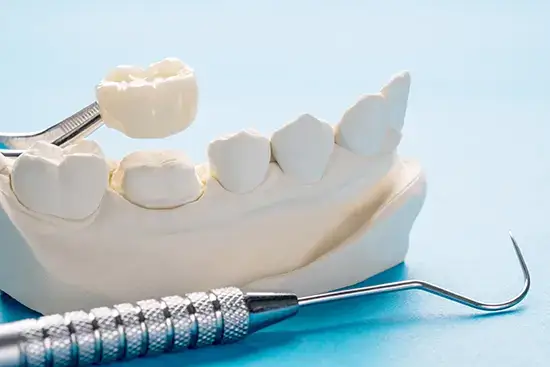A dental crown, sometimes referred to as a cap, is a long-term, semi-permanent dental prosthetic that restores the form, function, and aesthetic beauty of a natural tooth, helping to maintain oral health, confidence, and quality of life. It has a hollow design, which allows it to completely cover or cap the portion of the tooth that is located above the gum line, and it’s secured with dental cement.
Crowns are primarily used for restorative and cosmetic purposes, but they’re not the right solution for everyone.
In this article, we’ll discuss the most common reasons why we recommend dental crowns.

Several genetic factors, congenital issues, medical conditions, and environmental influences can impact the development of your dentition, resulting in the occurrence of irregularly sized or shaped teeth, such as microdontia (small teeth), taurodontism (enlarged pulp chambers and shortened roots), peg teeth (cone-shaped teeth), or Hutchinson’s incisors (notched incisors).
In these cases, the shape or size of the teeth can negatively impact the smile’s appearance, affecting its symmetry and balance with neighboring facial features. Some of these issues can also increase the risk of oral health issues by weakening the overall structure of the affected teeth. We can apply dental crowns to protect and strengthen the natural teeth while correcting their aesthetic appearance to promote a more balanced, symmetrical smile.
In cases of tooth agenesis, where one or more teeth fail to develop, dental crowns can be used to anchor a dental bridge designed to fill in gaps and replace missing teeth.
While some minor chips can be adequately addressed with dental composite bonding, more severe chips or significantly fractured teeth can compromise the strength, integrity, and health of a tooth’s overall structure. In these cases, repairing the chip or break with dental bonding alone can leave the tooth susceptible to infection or further damage. As a result, more severe chips and fractures should be addressed with a dental crown that seals and supports the tooth, helping to prevent further damage and infection.
Professional teeth whitening is the most effective way to lift stubborn stains from tooth enamel to create an even, bright-white appearance. However, it can’t successfully address all types of stains and discoloration, especially severe or permanent cases. In such cases, dental crowns are one option for masking the appearance of tooth discoloration. Dental crowns, as opposed to dental veneers or cosmetic bonding, are typically a good choice for patients who will also benefit from the restorative advantages that dental crowns offer.
The hard, protective, outermost layer of your teeth is called tooth enamel. The enamel can be lost or worn away as a result of wear and tear from bruxism, consuming a particularly acidic diet, suffering from chronic dry mouth, having poor oral hygiene practices, or as a side effect of certain medications. If your enamel wears thin or is lost, it can cause painful tooth sensitivity and leave your tooth more vulnerable to damage, decay, and infection.
In some cases, lost tooth enamel can be addressed with dental bonding. However, more severe or extensive enamel loss is usually more effectively addressed with dental crowns that securely seal the entire surface of a tooth with a single, long-lasting prosthetic.
One of the most common treatment cases for a dental crown is after root canal therapy. Patients undergo root canal treatment to eliminate bacterial infection and inflammation of a tooth’s root canals and interior pulp. After this treatment, it is necessary to seal and reinforce the tooth’s structure with a dental crown.
The risks associated with dental crowns are rare and typically pale in comparison to the risk of letting oral health issues go untreated. That being said, the most common issues experienced as a result of treatment with dental crowns can include:
At Kardynal Dental, we take special care in each of our treatment cases to minimize risks, side effects, and treatment complications. We provide highly personalized treatment plans and execute them with custom designs to ensure optimal treatment outcomes, oral health, and patient satisfaction.
Dental crown types are generally classified by the material they are made from. The most common types include:
The type of crown that is right for your treatment depends on several factors, including the location of the crown, the type of tooth being treated, and your personal preferences.
In most restorative cosmetic cases, several different options exist beyond dental crowns, including indirect fillings, dental bonding, and veneers. If you’re not sure if a dental crown is the right treatment option for you, schedule a consultation at Kardynal Dental.
During your consultation, our dentists will sit down with you to discuss your concerns, examine your teeth and gums, and offer a variety of treatment options based on your unique circumstances and goals. After explaining the processes associated with each course of action, we will answer any questions you have and help you determine which treatment plan will best meet your needs. We look forward to meeting you!